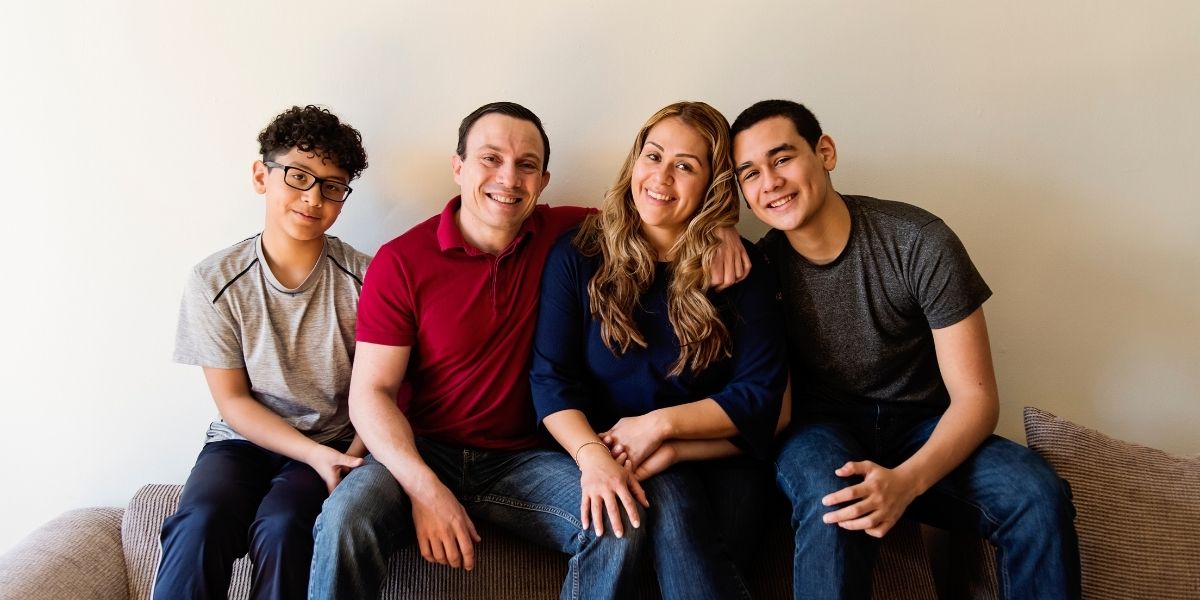Family Therapy – A Critical Component of Addiction Treatment
Updated: March 26, 2021
Treating alcoholism and substance abuse as a family disease
For family members who may be predisposed to addiction and substance abuse, family therapy is critical. Addiction is a family disease. According to the National Institute of Health’s National Institute on Alcohol Abuse and Alcoholism (NIAAA), “alcohol use disorder (AUD) often seems to run in families.1” There is a genetic component to addiction which means that addicts and alcoholics can pass the gene of addiction down to their family members.
Genetics are only one component of addiction and are not predetermining factors. That means that treatment tools, like family therapy, play a vital and therapeutic role in breaking the generational cycle of addiction. Learn more about alcoholism and genetics by reading NIAAA’s article on the topic.
What is the Family Therapy Model of Addiction Therapy?
And how a family program can help your family
Family Behavior Therapy (FBT) is a form of behavioral therapy that is used to treat families who have a member suffering from alcoholism or addiction. The family therapy model is used to treat the family system and helps both addicts and families recover as co-occurring issues (such as domestic abuse, familial discord, and dysfunction) are addressed in conjunction with the addict’s primary diagnosis of addiction.
All families experience some degree of dysfunction. This model of treatment focuses on the family as a unit, rather than the addict as a single patient.
A family therapy program can help:
- Build or rebuild trust among family members
- Create a supportive environment for all
- Help families forgive one another and move forward
- Resolve family conflicts in positive ways
- Teach families to handle a crisis as a unit
By working as a unit, families can create a healthier future for all. They can learn new coping skills, break destructive patterns of behavior and join forces to break the cycle of addiction – even if it has existed for multiple generations.
It is important to mention that the family therapy model does not define what a family is. There is no presumption of what the typical family is or is not. All family systems are valid, and all can benefit from the treatment of addiction as a family disease.
Family Therapy and Child Welfare
In a family program, therapy is geared toward protecting children
According to the National Institute on Drug Abuse’s Drug and Health blog, approximately 25 percent of children under the age of 18 are exposed to alcoholism, addiction, and substance abuse.
Children of addicted parents may be subject to neglect and abuse and are at risk of being removed from the home and placed into foster care. These children are “more likely to develop depression or anxiety in adolescence and use alcohol or other drugs early on 2.”
Family therapy and early intervention in the treatment of addiction can protect children from the complex risk of continuing the generational cycle of substance abuse. Children of addicted parents may be held responsible for caring for their younger siblings or their addicted parent. Therapeutic family therapy can help children and their parents improve the family dynamic and structure.
The restoration of the family unit is a critical goal in this model of treatment. When successful, it helps addicted parents become responsible and allows children the opportunity to heal.
Family program for Parents with Addicted Children
Practical tools that help parents stop enabling teen addicts
Teenaged addicts and alcoholics pose a genuine challenge to parents. Many parents are so terrified of the consequences their child may face that they become codependent. Merriam-Webster defines codependence as “a psychological condition or a relationship in which a person is controlled or manipulated by another who is affected with a pathological condition (such as an addiction to alcohol or heroin). 3“
Codependent parents need treatment just as much as a teenaged addict does. For recovery to occur, parents need behavioral therapy that employs positive coping tools that replace unhealthy and codependent behavior.
If you have a teenager addicted to opiates in Atlanta, read our earlier blog post on that topic.
“Family Therapy Can Help”
A free resource from SAMHSA
The Substance Abuse and Mental Health Services Administration (SAMHSA) has created a free brochure called “Family Therapy Can Help.” Please download SAMHSA’s brochure to learn:
- What is family therapy?
- Who can attend family therapy?
- When should family therapy start?
- What are the goals of family therapy?
- Is family therapy the same as family education?
- Who conducts family therapy sessions?
- How is family therapy organized?
- What happens in a particular session?
- What if family members are unwilling to take part?
- Is family therapy effective?
If You Have a Family Member Struggling with Addiction
At Breakthrough Recovery Outreach Help is available
Family therapy is a critical component to the treatment of alcohol abuse and addiction. For optimal outcomes, addicts and their families benefit from a wide array of recovery services, including inpatient treatment, residential treatment, out-patient treatment, and 12-step programs.
Please know, though, that you can start healing before your addicted or alcoholic family member chooses to.
If your family member is unwilling to get help for their addiction, there is help available to you. Al-Anon and Nar-Anon are 12-Step Programs that support the family members of alcoholics and drug addicts.
The 12-step programs offer family members a safe place to discuss their issues with others who have experienced or are experiencing the same problems.
For information about Al-Anon, please visit https://al-anon.org/.
For information about Nar-Anon, please visit https://www.nar-anon.org/.
Breakthrough Recovery Outreach Offers a proven Family Program That Includes Therapy and More
If you or a family member wants to take the first step toward a new life in recovery, we’d love to help you get started.
Call us at 770-493-7750 or email us at info@my-breakthrough.com or cjacobs@mybreakthrough.com and let us help you and your family get back on track.
Breakthrough Recovery Outreach accepts most insurance plans and is committed to the recovery of addicts, alcoholics, and their family members. Learn more about the family resources we offer by viewing our Family Program.
I’m Ready to Take the First Step
1National Institute of Health, National Institute on Alcohol Abuse and Alcoholism, Genetics of Alcohol Use Disorder, n.d. Web, https://www.niaaa.nih.gov/alcohol-health/overview-alcohol-consumption/alcohol-use-disorders/genetics-alcohol-use-disorders (Accessed July 30, 2018). 2Bellum, Sarah. Helping Parents of Addicted Children Find Help, https://teens.drugabuse.gov/blog/post/helping-children-addicted-parents-find-help (February 16, 2012). 3Merriam-Webster, Codependency, n.d., Web, https://www.merriam-webster.com/dictionary/codependency (Accessed July 30, 2018).




